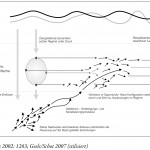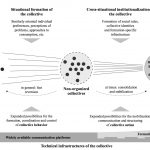1. Februar 2017
Heute ist der Artikel »The Logic of Digital Utopianism« von Sascha Dickel und mir in Nano Ethics erschienen.
With the Internet’s integration into mainstream society, online technologies have become a significant economic factor and a central aspect of everyday life. Thus, it is not surprising that news providers and social scientists regularly offer media-induced visions of a nearby future and that these horizons of expectation are continually expanding. This is true not only for the Web as a traditional media technology but also for 3D printing, which has freed modern media utopianism from its stigma of immateriality. Our article explores the fundamental semantic structures and simplification patterns of popular media utopias and unfolds the thesis that their resounding success is based on their instantaneous connectivity and compatibility to societal discourses in a broad variety of cultural, political, or economic contexts. Further, it addresses the social functions of utopian concepts in the digital realm.
27. Januar 2017
Es gab eine Zeit, in der ein Buch, das 1967 im englischsprachigen Original vorlag, vier Jahre später als deutschsprachiges Taschenbuch noch als ›brandneu‹ vermarktet werden konnte, »gespickt mit Daten, Kurven, Tabellen, vollgepfropft mit Fakten« (allerdings über eine 30 Jahre entfernte Zukunft). Dieses Buch – Ihr werdet es erleben. Voraussagen der Wissenschaft bis zum Jahre 2000 (Kahn/Wiener 1971) – ist mir jüngst erneut in die Hand gefallen und zeigt meines Erachtens einmal mehr, dass viele Hoffnungen und Ängste, die wir gegenwärtig an neue Technologien knüpfen, ihren Ursprung in einem Diskurs weit vor unserer Zeit finden. Einige Ausschnitte:
4. Januar 2017
Zwischen den Jahren habe ich – angeregt durch eine weihnachtliche Schenkung – endlich E.M. Forsters dystopische Erzählung »The Machine Stops�« aus dem Jahre 1909 gelesen [gemeinfreies PDF engl.; EPUB und Kindle engl.; Artikel von L.M. Stoltenberg mit Bezug zum Text], die 2016 in einer Neuübersetzung wiederaufgelegt worden ist – passenderweise versehen mit einem kurzen Kommentar von Jaron Lanier.
Dieses Buch ist eine eindringliche Warnung vor schierer Technikgläubigkeit, welche es auch heute noch (oder: mehr denn je) wert ist, gehört zu werden, zumal E.M. Forster unzählige technische Entwicklungen vorwegnimmt, die heute integraler Bestandteil unseres Alltags sind oder dies in naher Zukunft sein werden (darunter etwa das ›Internet der Dinge‹) – auch wenn der Mensch bzw. sein Umgang mit neuen Technologien in dieser Geschichte m.E. systematisch unterschätzt wird:
Weiterlesen »















